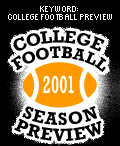Two-a-day workouts are just underway, and coaches across the country are
doing their obligatory rounds of interviews, giving fans a reason to look
with hope toward the coming season. So why are we talking about the Heisman
Trophy?
Part of the award's charm and curse is that it receives so much attention,
even before the first tackle is made. In no other sport do they begin to
handicap the field at such a stage. The season is allowed to play out, and
the winners typically make their case.
But in college football, the trophy that was originally called the
Downtown Athletic Club Award and dates to 1935 takes on a life of its own as
perhaps the most recognized individual award in sports.
Of course, it didn't start out that way. Jay Berwanger of the University
of Chicago won the first award and didn't hear about it until a letter
arrived in the mail. A year later, the award was named for John Heisman, the
legendary coach who had been the athletic director of the Downtown Athletic
Club.
|  | | Michael Vick was the No. pick in the NFL Draft, but wasn't good enough to win the Heisman. |
Heisman could have never envisioned the importance placed on his award
today.
Voters across the country will soon be inundated with postcards, notepads,
posters, T-shirts and brochures touting the various candidates. Newspapers
and websites will provide their weekly "Heisman Watch." Television will
give us updates, too.
And if you think this Heisman hype is a thing of the recent past, go back
to 1968, when Notre Dame got the idea to change the pronunciation of
quarterback Joe Theisman's name from "THEES-man" to Theisman, as in
Heisman.
It didn't work, but Theisman did finish second to Stanford's Jim Plunkett
in 1970.
Last year, Virginia Tech unveiled a special web page for quarterback
Michael Vick, who had finished third in the voting a year earlier. Tech
officials believed it was important to make people aware of Vick and his
accomplishments. They discussed a plan to put it together almost as soon as
returning home from a Sugar Bowl loss to Florida State, a game in which Vick
nonetheless had already emerged as a candidate for the 2000 season.
Alas, Vick didn't even get invited to New York for the ceremony. An ankle
injury hurt his chances. So did a Tech loss to Miami.
Yet Vick was still the No. 1 pick in NFL Draft, which again points out
that the best player is not always worthy of Heisman status.
In fact, the Heisman does not necessarily go to the best college player in
the country.
It is not based only on single-season performance.
It often comes down to marketing and hype.
And it definitely isn't fair.
Consider last year when Florida State's Chris Weinke won the award over
Oklahoma quarterback Josh Heupel by 76 points. Only 86.3 percent of eligible
voters cast ballots. There were 922 ballots mailed out by the Downtown
Athletic Club, but only 796 were counted.
And how many of those voters cast their ballots based on regional bias? It
is an understood practice, which sort of makes a mockery of the concept.
Shouldn't the voters choose whom they believe to be the best player in the
country?
Example. Two seasons ago, Wisconsin's Ron Dayne won the Heisman Trophy. He had 1,834 yards, capping a remarkable career. He was obviously rewarded for
his four-year prowess. And yet, during the 1999 season, Dayne was not the
leading rusher in the country, nor did he lead the nation in all-purpose
yards or scoring. In fact, his 1,834 yards were the lowest total by a Heisman
winner since Bo Jackson in 1985.
Then there's the 1997 season, when Michigan's Charles Woodson edged
Tennessee's Peyton Manning. Woodson, predominantly a defensive player, won
over the year-long favorite. But should Manning have even had a chance? Some
argued he wasn't even the nation's best quarterback that year, let alone the
best player. He was just fifth in passing yardage, tied for fifth in
touchdowns. There were 13 other quarterbacks with a better passing efficiency
rating.
So who are this year's contenders? It seems silly to say now, but a couple
of good guesses would be Northwestern tailback Damien Anderson, Clemson
quarterback Woody Dantzler and Indiana quarterback Antwaan Randle El.
Others being mentioned at this early date are Miami quarterback Ken
Dorsey, Nebraska quarterback Eric Crouch, Oregon quarterback Joey Harrington
and Oregon State tailback Ken Simonton.
It's really too easy to say who will emerge. The season needs to unfold.
But you can bet when the contenders line up in December, too many ballots,
too many regional biases and too much hype will overshadow the process.
Bob Harig covers college football for the St. Petersburg Times.
| |
|


